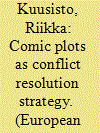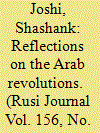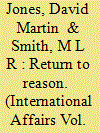| Srl | Item |
| 1 |
ID:
092881


|
|
|
|
|
| Publication |
2009.
|
| Summary/Abstract |
Recently, the 'war stories' of the leaders of the major Western powers - the United States, Britain and France - have adhered to two major plots: the heroic epic or the sad tragedy. The heroic script defines and explains conflicts in which the Western powers have wished to play an active role: the Persian Gulf (1990-1), Kosovo (1999) and the current war against terrorism. The tragic plot has been employed when they have ruled out forceful outside intervention, like in Bosnia (1992-5) and Rwanda (1994). Both scripts are highly problematic conflict resolution approaches: they point to black-and-white, aggressive denouements. An alternative is the comic plot: a story traditionally used in ordinary disagreements among friends, problems with 'small foes' and disputes with important rivals. Adopting a comic framework for most of the conflicts in the world would give the Western leaders more room to negotiate, to try out new ideas and to back down on unsuccessful strategies.
|
|
|
|
|
|
|
|
|
|
|
|
|
|
|
|
| 2 |
ID:
104765


|
|
|
|
|
| Publication |
2011.
|
| Summary/Abstract |
We are witnessing a series of revolutions and uprisings of a pace, connectivity and breadth for which the only parallel in modern history is 1989. But these aspirant and actual revolutions are incomplete, uneven and unpredictable. Shashank Joshi argues that long-held assumptions about the Western trilemma in the Middle East - the choice between democracy, stability and pro-Western foreign policy - must now be urgently re-evaluated.
|
|
|
|
|
|
|
|
|
|
|
|
|
|
|
|
| 3 |
ID:
141277


|
|
|
|
|
| Summary/Abstract |
Twenty-first-century political crises stretching from Europe to the Middle East and the Asia–Pacific have undermined the worldview that governed post-Cold War western thinking about a liberal end of history. This worldview assumed that shared norms and transnational institutions would transform the state based-order. In this context, the use of force is considered appropriate only for humanitarian ends meeting a set of predetermined axioms laid down in chapter 7 of the UN Charter. Yet for any strategy to be effective—in an international order subject to change—a clear political aim is required, which might deviate from the general rule. Preoccupied with universal postulates, legal normativism has lost sight of the particular. The argument put forth in this article is that the failure of contemporary western foreign policy in the twenty-first century to address this limitation or to prioritize political ends has led to strategic confusion from Afghanistan to Syria and Ukraine. In this context, it might be useful to reappraise the utility of abstract rationalist approaches to global governance and return instead to an earlier understanding of statecraft that avoided premature generalizations and treated norms as maxims of prudence rather than axioms requiring universal application.
|
|
|
|
|
|
|
|
|
|
|
|
|
|
|
|